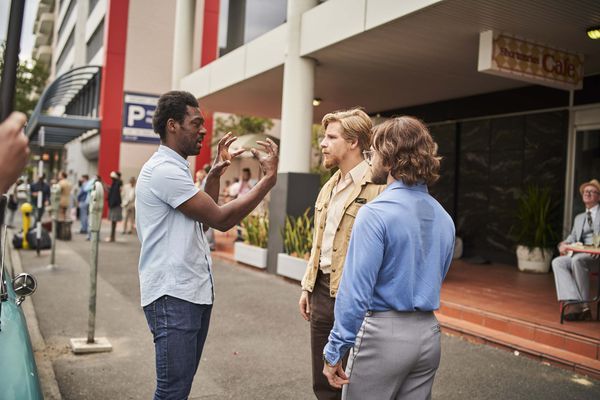 |
| Francis Annan, Daniel Webber and Daniel Radcliffe on the set of Escape From Pretoria Photo: courtesy of Signature Entertainment |
A little over three decades ago, I played my small part in the battle against Apartheid in South Africa, encouraging the boycott of South African fruit that activists in that country had requested of those living elsewhere in the world. Looking back, it seems more absurd than ever that such injustice should have been permitted to flourish for as long as it did – a whole country with a legal system built upon the premise that one group of people were categorically inferior to another because of their ethnicity, and brazenly, brutally so, even in the late 20th Century. Escape From Pretoria, the new film from Francis Annan, carries us back to that time and celebrates the people who fought for change in far more extreme circumstances than mine simply because they felt that to do nothing was to be complicit.
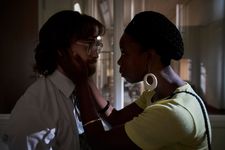 |
| Tim Jenkin (Daniel Radcliffe) s forced to part with girlfriend Daphne (Ratidzo Mambo) in the opening scenes. |
It’s based on the autobiography of Tim Jenkin and recounts the true story of how he and fellow political prisoners Stephen Lee and Denis Goldberg – all white men enjoying substantially better conditions than the black convicts on Robben Island, but still confronted with day to day cruelty – plotted their escape. Talking to Francis whilst he was at the Glasgow Film Festival, I asked him how, as someone who was born in 1984, he first became aware of what was happening in South Arica.
“To put it in perspective, it’s a bit like how Brits or other Europeans looked at East versus West Germany, or Chechnya or Yugoslavia,” he explains, reflecting on his experience growing up in a family with strong connections to the African continent. “It was that kind of weird... What the heck? Like, how has that happened? In places like Kenya or other East African countries there was much more peace between the European and the African communities and in West Africa it was the same thing, so how did it happen in South Africa that there was this thing? I think a lot of Africans had a kind of voyeuristic sense of intrigue as to, like, how could that possibly have happened?
“My grandfather and my mum would go over to Africa and they’d come back with all these stories. My mum would tell me all these stories about, you know, how crazy it is over there. So I had those early memories. My grandfather met Mandela. So that was my more distant access to it and then I met the producers in 2012 and they had actually met Tim [Jenkin] back in 2003 and got talking. They eventually got the rights to his book and then met me.
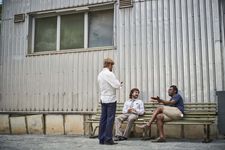 |
| Daniel Webber, Daniel Radcliffe and Francis Annan at work Photo: courtesy of Signature Entertainment |
“I said ‘I love politics. I love African politics but then I love all politics,’ and they said ‘Literally, we’ve got the exact film for you. Wait there.’ They gave me the book and I got right back. I was very, very interested in the book.”
There’s a generation of filmgoers now who grew up after Apartheid ended. How did he approach having to convey not only the immediate dangers faced by the characters in the film but also the profound strangeness of living under a system like that?
“The opening tries to set the context and I like that because first of all it makes the film feel a lot more grounded and it puts it in a very realistic framework, but it’s also for audience members who maybe don’t really understand what Apartheid is,” he says.
“There was a lot of scenes that I didn’t want to lose that I had to lose for very good reasons but there’s still one scene where you realise that although all the main characters are against Apartheid there are very divergent views as to what the method of fighting Apartheid should be. I was quite keen to try and keep that element because otherwise it can seem a bit too clean cut, like ‘everyone’s against Apartheid, this is the way to dismantle Apartheid, finished,’ and, like no. It depends on things like when people were born. The younger generation were potentially more militant. So it was an attempt to look at how it wasn’t so clean cut. People had very different and very passionately held opposing views as to what the best method was.”
!["People had very different and very passionately held opposing views as to what the best method [of dismantling Apartheid] was"](/images/newsite/Ian_Hart_and_Daniel_Radcliffe__in_Escape_from_Pretoria_Signature_Entertainment_6th_March_225.jpg) |
| "People had very different and very passionately held opposing views as to what the best method [of dismantling Apartheid] was" Photo: courtesy of Signature Entertainment |
Pulling the whole thing together to make it work the way he wanted was quite a challenge, he says.
“The budget spiralled. We had to make a lot of little cuts to get everything to fit, which meant that certain scenes were lost which meant that other things didn’t work. And also we wanted to make the film...” he hesitates, no wanting to use the word ‘commercial’, eventually settling for ‘broader’.
“There were some other political scenes which I really liked but the decision was made to trim those down or lose them so we’d have more time to explore the escape itself.”
With a film of this sort there’s also the challenge of making it scary when – in no small part thanks to the title – most viewers will feel certain that at least one person escapes successfully.
“There’s a French film by Robert Bresson called A Man Escaped that’s like, that’s it, a man escapes. Right? A yet watching it, you’re gripped. Then there are a lot of Hollywood films where it’s a historical event and so so you know what’s going to happen and yet you’re still gripped. Because I think the way that films work and the way that human minds work is that you forget, because you’re in the trenches.”
It’s difficult, he acknowledges, keeping the audience in that state of mind.
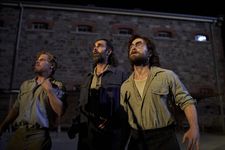 |
| "In reality they were always very nervous and frightened" - Francis Annan on the real life escape planners Photo: courtesy of Signature Entertainment |
“I felt that the antidote to people going ‘Well, they escape, don’t they?’ was to really be very immersive in the way that you experience each element of their escape attempt. The more immersive it is, the more that distracts you from the end.”
Does his film diverge much from what happened in reality? He says not – with a caveat.
“What I had to do was condense because in reality it was over 18 months. The reality was that they would go and try doing one bit of the escape and come back, and they did that eight times over three months but I couldn’t show them doing that eight times. Sometimes they’d find eight pieces of the puzzle they needed to solve but showing people eight pieces of the puzzle in one scene is too much so sometimes I’d have to decide, well, these three pieces of the puzzle are the main things that help them get to the next stage, so I’m going to show those three bits.”
He also left out some of the planning stages, he says, because they would reduce the tension in the film despite the fact that the tension was very much present in reality because things would still go wrong and the would-be escapees were always “very nervous and frightened.”
Doubtless many people going to see the film will do so as fans of one of its actors, Daniel Radcliffe. What was he like to work with?
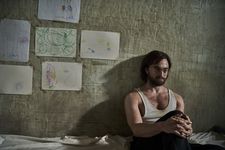 |
| On Daniel Radcliffe: "I couldn’t have asked for a better actor" Photo: courtesy of Signature Entertainment |
“He’s very pragmatic and he’s very anti-star,” Francis says. “He actively doesn’t like all that BS – it turns him off, which is great. I knew that I was going to have to shoot quickly and therefore I needed somebody that wasn’t going to get peeved by being pushed every day and being told ‘Move here, keep going here...’ And because there was a lot of off-camera sound, I needed a lot of reactions to things that were off-camera. Some actors don’t like that. But he loves that. He’s more than happy to be cued off-camera. And he was always helping. When I was kind of sat there, racking my brains, he was just like suggesting some little adjustment and bang! Everything works.
“He’s obviously famous for learning his lines back to front, you know, all his stage stuff. He’s come on set totally off-book and ready to roll. So yeah, I couldn’t have asked for a better actor really. He was very technically proficient and really invested in the film. It was great.”
Finally, how does he feel about his film screening at the Glasgow Film Festival?
“It’s brilliant,” he says. “In Glasgow they like cinema, you know? The festival director came up and we had a really good chat. They’re hunting for cinema. And what I mean by cinema is films that are not just popcorn-based films but films that have meaning. So it’s nice to get their endorsement.
“This will be the first time that a fee paying audience will be able to see the film ahead of its release on the 6th of March. It’ll be fun to sit with an audience and see how the film works.”





















